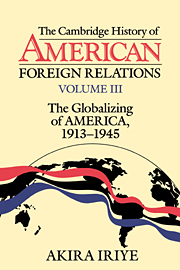Book contents
- Frontmatter
- 1 The age of European domination
- 2 The Great War and American neutrality
- 3 The United States at war
- 4 The Versailles peace
- 5 The 1920s: the security aspect
- 6 The 1920s: the economic aspect
- 7 The 1920s: the cultural aspect
- 8 The collapse of international order
- 9 Totalitarianism and the survival of democracy
- 10 The emergence of geopolitics
- 11 The road to Pearl Harbor
- 12 The global conflict
- Bibliographic Essay
- Index
- THE CAMBRIDGE HISTORY OF AMERICAN FOREIGN RELATIONS
- References
8 - The collapse of international order
Published online by Cambridge University Press: 28 March 2008
- Frontmatter
- 1 The age of European domination
- 2 The Great War and American neutrality
- 3 The United States at war
- 4 The Versailles peace
- 5 The 1920s: the security aspect
- 6 The 1920s: the economic aspect
- 7 The 1920s: the cultural aspect
- 8 The collapse of international order
- 9 Totalitarianism and the survival of democracy
- 10 The emergence of geopolitics
- 11 The road to Pearl Harbor
- 12 The global conflict
- Bibliographic Essay
- Index
- THE CAMBRIDGE HISTORY OF AMERICAN FOREIGN RELATIONS
- References
Summary
The world economy in disarray
One would never know if the collapse of the American economy and, as a consequence, of the world economic order in the years following 1929 was more or less preordained by the very structure of economic affairs during the 1920s, or whether the prosperity and peace of the postwar decade could somehow have been maintained if the United States and other nations had taken more forceful measures to cope with the economic crisis at its inception. One thing is certain, however. The world economy of the 1920s had been so intertwined with American economic resources and performance that whether the relative stability and prosperity of the postwar decade could have been perpetuated hinged to a considerable extent on action taken by American officials, bankers, and others. Their inaction or passivity, by the same token, would have profound implications for world affairs of the 1930s.
As of 1929, the United States still accounted for 40 percent of the world’s industrial production, 50 percent of the world gold reserve, and 16 percent of international trade. Should something happen to the American economy, therefore, it would have a severe impact on other countries. And, indeed, something drastic did take place; after the stock market crash of October 1929, production was cut by 50 percent by 1932, export trade fell by 60 percent, and unemployment rose from 1.5 million to 12 million in the same period. Industrial and agricultural prices fell, wages for those still employed declined, personal and business bankruptcies were legion, and the cult of productivity and efficiency as the prevailing ethos of the first postwar decade was replaced by severe attacks on capitalism.
- Type
- Chapter
- Information
- The Cambridge History of American Foreign Relations , pp. 116 - 130Publisher: Cambridge University PressPrint publication year: 1993



